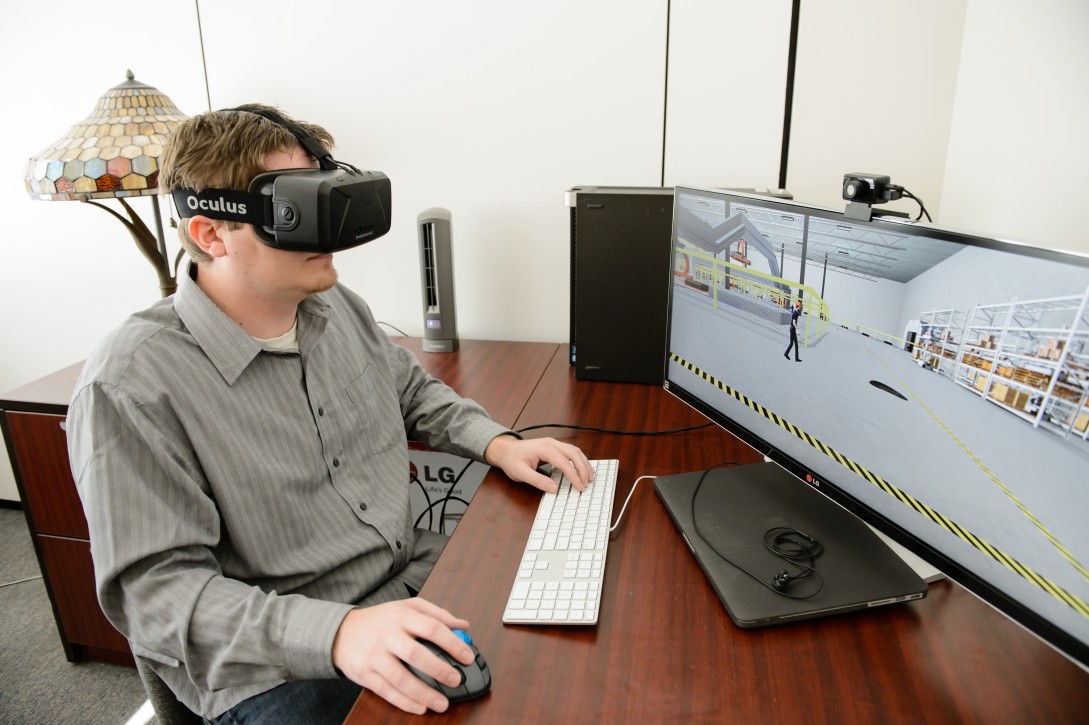Clemson University experts will create virtual reality training programs and help veterans integrate into the workforce as part of a $317-million plan that aims to shake the very core of U.S. textile manufacturing, remaking the industry into a high-tech business.
The group that will oversee the plan is Advanced Functional Fabrics of America, which includes 16 industry members, 31 universities, 72 manufacturing entities and 26 startup incubators spanning 28 states. Its formation will be announced Friday at the Massachusetts Institute of Technology by Secretary of Defense Ashton Carter.
Researchers use the Oculus Rift headset to create virtual reality simulations that teach skills needed in a modern manufacturing plant.
Researchers use the Oculus Rift headset to create virtual reality simulations that teach skills needed in a modern manufacturing plant.
Advanced Functional Fabrics of America predicted its efforts will lead to an increase of more than 50,000 jobs in a wide range of U.S. industries by 2025 while advancing textile products that can see, hear, sense, communicate, monitor health, change color and store and convert energy.
Members hope that by combining previously isolated strengths they can build an engine that provides key services to industry, ranging from building prototypes to helping educate the employees who will work in textile plants of the future.
Their goal is to enable American companies to expand and capture 30 percent of the global technical textiles market. Some of the globe’s most-recognizable brands are involved, including Corning, DuPont, Intel, Nike, The North Face and Timberland.
Participants from South Carolina are the Clemson University Center for Workforce Development, Milliken, Inman Mills and the South Carolina Manufacturing Extension Partnership.
Kris Frady, the operations director at the Center for Workforce Development, said experts from the center will create virtual reality training tools, including factory simulations specific to fiber and textile facilities, as part of a pilot program based in South Carolina.
They will also develop two iBooks on fiber and textile manufacturing careers, one targeted toward women and one for veterans.
“The textile technology revolution will need skilled employees, and that’s where the Center for Workforce Development can help,” she said. “Through our participation in this initiative, the Center for Workforce Development is continuing to widen the talent pipeline from academia to industry.”
Kapil Chalil Madathil, the director of technology operations at the Center for Workforce Development, said the center’s previous work in virtual reality uniquely qualifies it to participate in Advanced Functional Fabrics of America.
“We have developed several cutting-edge virtual reality simulations that allow students to repeatedly practice tasks in a safe environment,” he said. “The simulations add a level of authenticity that helps students remember their lessons.”
An analysis found that nearly 50 percent of the new job opportunities through 2020 will be categorized as “middle skills,” according to Advanced Functional Fabrics of America
As many as 30 percent of the 620,000 middle-skills workers in textiles and related fields will need to acquire new skills, the organization found.
The new initiative will receive $75 million in federal funding out of a total of $317 million through cost sharing among the Department of Defense, industrial partners, venture capitalists and the Commonwealth of Massachusetts. The funding will cover a five-year period and will be administered through the new, independent, nonprofit organization set up for the purpose.
It is headquartered in Cambridge, Massachusetts, near MIT. Frady will be on the leadership team, serving as veteran integration deputy.
As part of her duties, she will coordinate the efforts of several government agencies to get veterans the skills they will need to qualify for jobs in the advanced textile industry.
“We are honoring a commitment to support veterans that goes back to Clemson’s founding as a military academy,” said Frady, who is also an assistant professor in the Eugene T. Moore School of Education. “We’re extremely pleased to be a part of this collaboration.”
Experts said the newly created jobs will require a background in science, technology, engineering and math, or STEM, and that demand is high among students in the South Carolina’s K-12 system.
An analysis found that 24,328 students were interested in STEM careers, according to ShapingOurFuture.org.
One of the virtual reality simulations the Center for Workforce Development previously created allows students to move through a manufacturing plant from a first-person viewpoint to learn about safety. With other simulations, students take apart machines and put them back together to better learn how they work.
The simulations have been included in EducateWorkforce, a program that has been used by more than 1,000 students in 22 states.
“The beauty of our involvement in Advanced Functional Fabrics of America is that we already have laid the groundwork and have shown these simulations work,” Chalil Madathil said. “Now we need to adapt it to the specific needs of the advanced fiber and textile industry.”
The virtual reality simulations were developed through the National Science Foundation Advanced Technological Education Center for Aviation and Automotive Technological Education Using Virtual E-Schools, also known as CA2VES.
CA2VES is a part of the Center for Workforce Development.
Anand Gramopadhye, dean of the College of Engineering and Science and principal investigator on CA2VES, said that Advanced Functional Fabrics of America will be transformational not only for South Carolina but the entire nation.
“Clemson is strategically positioned in the Upstate of South Carolina, an area with long experience in textiles and advanced manufacturing,” he said. “We look forward to participating in an initiative that shows high promise for creating well-paying jobs that help American families put food on the table.”
Three initial projects have been proposed for Advanced Functional Fabrics of America: the physical and digital archiving of fiber and fabric properties; the design and manufacturing of low-emissivity uniforms for the military; and the manufacturing of fabrics that convert sunlight to electrical power.
Paul Alongi, College of Engineering and Science
April 1, 2016

